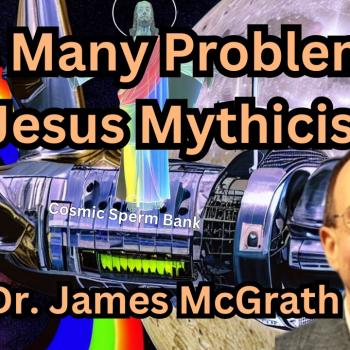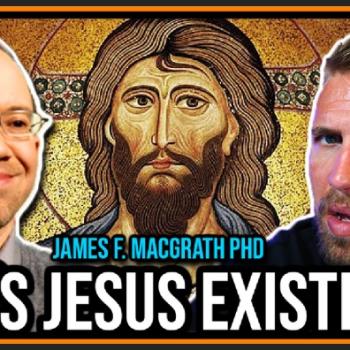Jerry Coyne has been very candid about the anti-religious motivation that leads him and other atheists to want Jesus not to have existed, to find it advantageous if Jesus did not exist. Of course, he doesn’t seem to have grasped the extent to which solid evidence that Jesus existed but was different from what Christians claim might be even more desirable from that perspective. But I appreciate the honesty, even if it has not yet been matched with a recognition that we need to be cautious about our desires distorting our perception.
Coyne also shared a guest post from Ben Goren, offering what he calls “The Jesus Challenge.” Here’s what he is talking about:
- Start with a clear, concise, unambiguous definition of who Jesus was. Do the Gospels offer a good biography of him? Was he some randomschmuck of a crazy street preacher whom nobody would even thought to have noticed? Was he a rebel commando, as I’ve even heard some argue?
- Offer positive evidence reliably dated to within a century or so of whenever you think Jesus lived that directly supports your position. Don’t merely cite evidence that doesn’t contradict it; if, for example, you were to claim that Jesus was a rebel commando, you’d have to find a source that explicitly says so.
- Ancient sources being what they are, there’s an overwhelming chance that the evidence you choose to support your theory will also contain significant elements that do not support it. Take a moment to reconcile this fact in a plausible manner. What criteria do you use to pick and choose?
- There will be lots of other significant pieces of evidence that contradict your hypothetical Jesus. Even literalist Christians have the Apocrypha to contend with, and most everybody else is comfortable observing widespread self-contradiction merely within the New Testament itself. Offer a reasonable standard by which evidence that contradicts your own position may be dismissed, and apply it to an example or two.
- Take at least a moment to explain how Jesus could have gone completely unnoticed by all contemporary writers (especially those of the Dead Sea Scrolls, Philo, Pliny the Elder, and the various Roman Satirists) yet is described in the New Testament as an otherworldly larger-than-life divine figure who was spectacularly publicly active throughout the region.
- Last, as validation, demonstrate your methods reliable by applying them to other well-known examples from history. For example, compare and contrast another historical figure with an ahistorical figure using your standards.
Unfortunately he doesn’t seem to take his own challenge seriously – he suggests that Jesus was a figure in a syncretistic cult, pointing to Justin Martyr as evidence. He largely ignores, and when he doesn’t he distorts, the evidence from earlier sources. Jumping to the Gospel of Matthew, without noting that the supernatural element at the crucifixion has increased compared to Mark, is not doing justice to the evidence. Goren also ignores the possibility that Justin may have been responding to people who were distorting the evidence for precisely the same reason that Jerry Coyne does, motivated as indicated above.
Be that as it may, I’d like to suggest (as the title of this post indicates), that “Christianity” is evidence against precisely Goren’s sort of mythicist scenario, which imagines Jesus being invented as part of a savior cult with a purely mythical or celestial figure.
Obvious problems with this include that Paul gives this figure an ordinary human name, and says things about him – such as that he was descended from David – which it is very hard to transfer to the celestial realm, and impossible to do so in a way that seems more likely to be what Paul meant than what professional historians understand him to have meant.
One tactic I’ve seen used to deal with this is to push the celestial stage back even earlier than Paul, so that by Paul’s time the euhemerization process has begun.
But that doesn’t work, because of “Christianity.” Not the movement, but the term itself, the label.
In Paul’s time, the movement that he was part of apparently did not even have a clear label that had been affixed to it. He doesn’t use the term “Christian.” He talks about those who are “in Christ” and “Christ’s” (i.e. in the anointed one and belonging to the anointed one).
Trying to push the origins back to the distant past, long before the time of Paul, is yet one more move by mythicists that poorly fits the evidence.
What do you think of Goren’s challenge? Would it be worth my time to undertake it, given the ample evidence that mythicists are resistant to changing their minds even in light of abundant historical scholarship, never mind single blog posts?
If you were to tackle Goren’s challenge, how would you do it? Use the comments section to present your cases!












